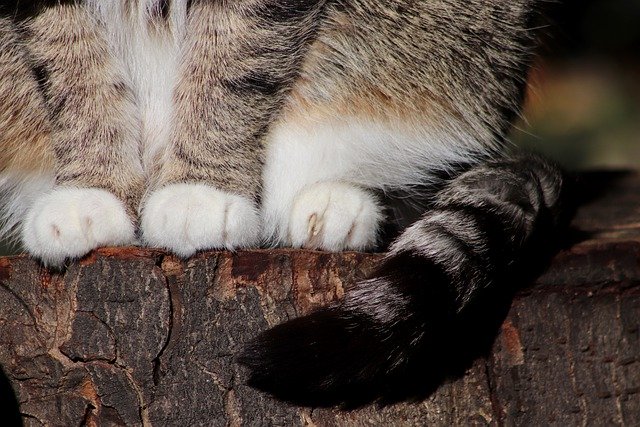A cat chasing their tail is usually considered normal behavior. However, if it happens suddenly and aggressively, it might be a sign of an underlying problem.
- The cat might be bored with its surroundings
- Their tail might be itchy as a result of an allergy
- The cat might be infested by fleas
- They might be suffering from an infection or hyperesthesia
- The cat might be experiencing mental problems, such as schizophrenia
Why Does My Cat Chase His Tail?
The sight of my cat running in circles trying to catch his tail has always caused me to burst out laughing. Sure, it is an amusing thing to watch, but it got me thinking about how illogical it is. Why does my cat chase his tail? After all, it is a part of his body, and he is supposed to realize that, right?
In order to answer this burning question, I did some research on the topic. As you might expect, the results were quite surprising — and some of them were genuinely scary. As it turns out, there are quite a lot of possible causes for a cat to chase their tail and not all of them are amusing. In this article, I will give you some possible answers to the question of why does my cat chase his tail.
Is a Cat Chasing Their Tail Considered Normal Behavior?
As we all know, cats are rather curious creatures. Because of this, they are often fascinated by their tails, especially if they are younger or short on other fun stuff to do. It is safe to say that a cat chasing their tail is something quite normal. However, it might also be the result of an underlying medical condition. There are certain warning signs that we, as responsible cat parents, should watch out for.
Let’s look at the most common answers to the question of why does my cat chase his tail.
Normal Reasons for a Cat Would Chase Their Tail
As I already stated, cats usually find their tails exceptionally interesting. As a result, they might feel inclined to chase them around as a way to have fun and satisfy their natural curiosity. On such occasions, we have nothing to worry about, as such behavior is completely normal — and even healthy!
Just for Fun
Sure, going around in circles trying to catch something can be quite fun. The entertainment can be endless when the thing you are chasing is literally impossible to catch! Cats would often pretend that their tail is a mouse and just chase it around. In doing this, they hone their hunting instincts, while getting a nice workout in the process. Of course, cats are fully aware that they are chasing their own appendage.
It is interesting to mention that the famous evolutionary scientist Charles Darwin stated that happy cats tend to chase their tails quite often. Indeed, this is the best possible answer to the question, Why does my cat chase his tail?
The Cat Has Nothing Better to Do
While chasing their own tail is perfectly natural for kittens, grown-up cats who do that might be doing it out of sheer boredom. Especially if the cat lives exclusively indoors, they might not have anything better to do. Some cats might even develop a “tail fetish” and lose interest in everything but their tail.
In such scenarios, we must provide the cat with interesting toys and keep them occupied with play sessions that do not involve their tail.
Medical Issues That Might Cause a Cat to Chase Their Tail
Now, let’s take a look at the more serious possible causes of the activity in question. In such cases, it is mandatory that we seek the help of a veterinarian. They will be able to give an accurate diagnosis and suggest proper treatment.
Allergies
Allergies in cats can be pretty rough. Some common symptoms include rashes, ear infections, and itchiness all over the body. More often than not, an allergy will cause the skin on our cat’s tail to become very dry and itchy. Our cat will try to do whatever they can to reach the itch, which will result in movements quite similar to them chasing their tail.
If our cat is suffering from allergies, we need to keep them from being exposed to the cause of the problem. There is a specific medication that can prevent or treat the issue, such as antihistamines and steroids. If we suspect that our cat is suffering from an allergy, we must bring them to the vet immediately.
Flea Infestation
Another possible answer to the question, why does my cat chase his tail? is that they might be infested by fleas. The nasty little creatures love gathering at the base of a cat’s tail and having a field day. What we see as our cat being silly might actually be their attempt to reach the spot where fleas are biting them. Cats infected by fleas would usually groom and scratch themselves excessively.
If we suspect that our cat has a flea problem, there are easy ways to confirm our suspicions. We need to simply look for any adult specimen on our cat’s skin. Visible flea bites are also a dead giveaway. Fortunately, getting rid of fleas is quite easy — consult with the vet and apply the proper treatment. Once the problem is taken care of, the cat will stop going in circles, seemingly trying to catch their tail.
Infection
Another possible cause for a cat to be heavily invested in their tail might be an infection in the area. For example, an infection of the anal gland is quite common in older cats. An untreated injury to the tail might also result in an infection. If that is the case with our cat, they are in need of treatment with antibiotics. Of course, we must make sure they are prescribed by a trusted veterinarian.
If the cat is male, like mine is, there is the possibility of the so-called “stub tail.” The term is used for an infection of the supracaudal gland that often occurs in male cats. The issue occurs because of overactive sebaceous glands, which are responsible for keeping the cat’s hair soft and are located near the base of the tail. However, if they produce too much oil, it might result in an irritating build-up and a subsequent infection.
Male cats that suffer from stub tail often need to be neutered. The treatment also involves practicing exceptional hygiene.
Hyperesthesia
This is a rather rare disease that can affect cats of all ages. It is caused by an overactive nervous system and makes a cat’s tail especially sensitive, resulting in a constant tingling sensation. As a result, the cat will constantly feel discomfort and try to locate the source. This condition can also result in panic attacks in some cats, so we should not take it lightly. A veterinarian will be able to make a correct diagnosis and prescribe the needed treatment.
Schizophrenia
Unfortunately, cats are not immune to mental problems, just like us humans. In some rare cases, cats might even develop schizophrenia. The disease can develop either because of old age (the so-called feline cognitive dysfunction disorder) or as a biochemical issue with the cat’s brain. Symptoms include dilated pupils, maniacal grooming, and of course, excessive tail-chasing.
When Should We Start Worrying?
As cat parents, we should be pretty familiar with our cat’s usual behavior. If an adult cat who has never exhibited such behavior before suddenly starts chasing their tail like crazy, that is a huge warning sign. Also, it should be pretty easy to differentiate between simple, playful chasing and aggressive behavior like biting. As we have established, there are many possible answers to the question of why does my cat chase his tail. We should investigate and see if there is an actual problem there, or our cat is just being silly.
Again, if we suspect that something is wrong with our cat, we must seek professional help immediately. After all, we do not want to risk our cat’s health, right?
How Can We Stop Our Cat from Chasing Their Tail?
If there are no underlying medical issues, a cat chasing their tail is nothing to worry about. However, in certain cases, the game might become a bit rough — some cats might end up injuring themselves with scratching and biting. If our cat’s behavior becomes problematic, we must try and stop them from chasing their tail.
The easiest way to do that is to provide an adequate alternative. We have all seen how cats react to laser pointers, so we consider this a viable option. Stringed toys and wands are also great for keeping our cat’s mind away from their tail. There are also plenty of interactive cat toys that can keep our pets occupied when we are not around to monitor them.
If our cat is obsessed with tails, it will not be wise to give them toys of a similar shape. We want them to get the idea out of their heads, not reinforce their behavior.
Why Does My Cat Chase His Tail Can Be a Tricky Question
As usual, I did not expect to uncover so many complex causes for a cat chasing their tail. From fleas and infections to actual mental problems — there are quite a lot of possible scenarios. However, in most cases, cats chase their tails just because it is fun, both for them and for us.
Still, we must be responsible and keep an eye on our cat at all times. Unusual behavior must not go unnoticed or unaddressed by a professional if needed. Hopefully, my article was useful for people who wonder why does my cat chase his tail. Make sure to check out the rest of my blog for more interesting articles on cats, dogs, and other pets. See you at the next one!
[su_box title=”Affiliate Disclosure”]This website is supported by its readers. Please assume that all links are affiliate links. If you make a purchase from one of the links we will make a commission from Amazon. Thank you.[/su_box]





